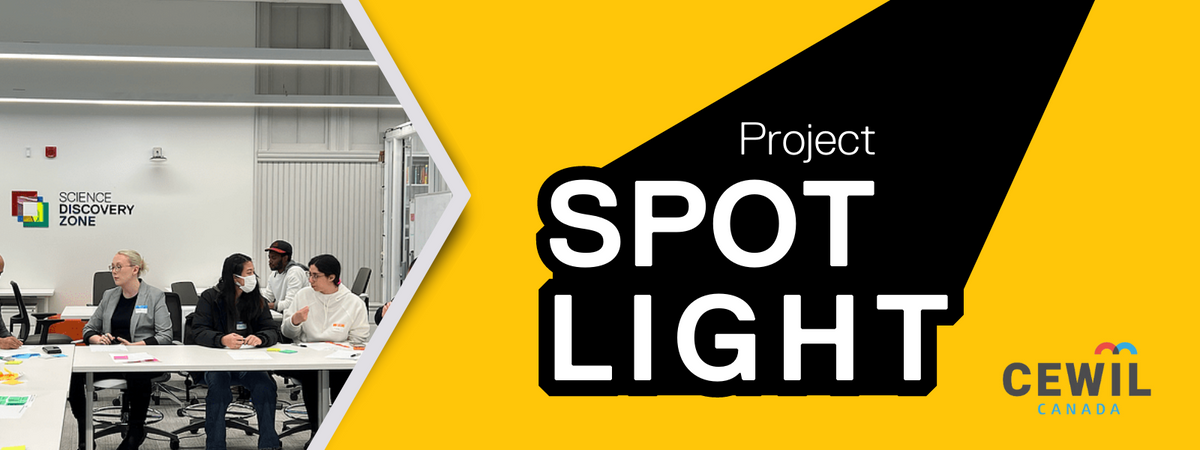CEWIL Project Spotlight | SCI888: Evidence-Based Innovation

Since 2021, TMU has received nearly $1.3 million in funding for work-integrated learning (WIL), notably, learning opportunities that focus on research and industry projects, field placements, and service-learning.
Of the many WIL funding bodies, the CEWIL iHUB (external link) , or the Co-Operative Education and Work-Integrated Learning Innovation Hub, has made a particularly significant impact on the TMU community. In 2021, CEWIL iHUB launched a three-round funding initiative to support work-integrated learning in post-secondary institutions. This funded 12 projects and aimed to expand access to WIL opportunities through new partnerships.
The EL Hub, a resource area within the Centre for Excellence in Learning and Teaching, was brought on to facilitate these projects and share the funding opportunities with the TMU community, assisting applicants in their applications, and liaising with stakeholders, essentially helping to bring these projects to life.
One of these projects is SCI888: Evidence-Based Innovation, a for-credit WIL course open to undergraduate students at TMU aimed at integrating the scientific method with innovation through idea shops. This course is run through Science Discovery Zone, a TMU incubator that takes evidence-based approaches to test big ideas and discover new ventures.
Students in this course learn the basics of Design Thinking while working to solve industry-provided problems, using the techniques and tools learned in class paired with the support of Science Discovery Zone mentors consisting of startup founders at the SDZ and within TMU’s Zone Learning ecosystem, researchers within the TMU community, and industry experts in the SDZ network. Previous industry partners include New School Foods (external link) , Enhanced Medical Nutrition (external link) , Biofect Innovations (external link) , Oxford Properties (external link) , CPMA (external link) , and CCI Bioenergy. (external link)
According to Ashnie Badal, Coordinator at Science Discovery Zone, students were able to choose to work on challenges in healthcare and biotech, sustainability, as well as food and agriculture, stating, “not only have these been identified within the industry as priority areas for innovation, but they are core industries we work in at the Science Discovery Zone. As such, we have within our network a variety of tools and experts that we were able to leverage to engage the students."
Examples of challenges students addressed have included:
- How might we provide university students access to affordable and culturally appropriate food on campus?
- How might we enhance the nutrition profile of cheap eats that are easily accessible to students?
- How might we tackle trachoma infections in rural / underdeveloped areas to reduce the resulting rate of blindness?
- How might we encourage more widespread use of organic fertilizers or expand the variety of crops they’re effective on.
Because the course is almost entirely self-driven, students are expected to document and reflect on their own learning while also leveraging existing technological tools in innovative ways. These tools include communication resources such as Google Drive, Zoom, and Discord as well as collaboration tools such as Jamboard and Mural.
For their final projects, students identify their own problem and recruit appropriate customers for discovery, as well as source their own relevant mentors to propose a solution.
“Students were encouraged to take the initiative and connect with mentors outside of our network,” says Badal. “We found that this practice helped students to strengthen their communication skills and enhance their confidence. Helping students through this was a good reminder of how few opportunities there are for students to network if they aren’t outgoing or confident in their speaking and communication skills.”
In terms of challenges for students, navigating the non-linear and flexible nature of this WIL opportunity was of particular note to Badal, mainly because students have grown accustomed to expect very clear instructions and processes when dealing with problem-solving, a reality which is rarely attributed to real-world industry issues.
The team at SDZ found that access to mentors, startup founders, and entrepreneurial resources were of great benefit to students dealing with this issue, as they were able to learn from the real-life experiences of those who have been through similar situations and have resorted to using the tools necessary to conduct their experiments and develop a strong information gathering process.
This need to develop collaboration skills, critical thinking, creativity, and adaptability is precisely why funded WIL opportunities are so critical, according to Badal, further pointing out that while some students see the benefit of WIL opportunities, they cannot participate because they are required, based on socio-economic status, to occupy their time with a paying job.
Projects such as this are good reminders that there is still room for increased opportunities to fund students’ growth, and like Science Discovery Zone has done with this course, allow for students to lean into their curiosity and creativity.